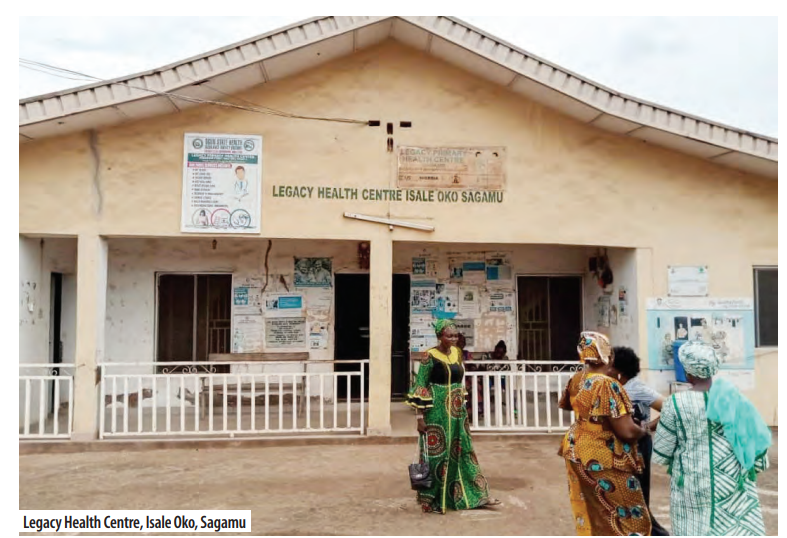Gender gaps in healthcare leadership in Ogun State contribute to challenges in maternal and child health outcomes. The underrepresentation of women in leadership roles limits diverse perspectives and decision-making that can enhance healthcare services. Addressing these gaps is crucial for improving health policies and outcomes for mothers and children.
Reality In Its Starkness
At the Legacy PHC in ard one, Shagamu, Ogun State, one perceives the dynamic challenges within the healthcare system, particularly regarding women’s health. Here, statistics transform into personal stories, highlighting the ongoing struggle for equitable healthcare access and the empowerment of women.
During a visit to Shagamu, Remo North, Odeda, and Abeokuta North local government areas (LGAs), it became evident that men predominantly hold leadership roles in the Ward Development Committees (WDCs), which are intended to address healthcare issues primarily impacting women.
Women, who have firsthand experience and understanding of maternal health challenges, are relegated to subordinate roles while men occupy the key leadership positions. In Shagamu, only one out of 15 wards is led by a woman, and in Odeda, the ratio of male to female chairpersons stands at 9:1, reflecting a consistent pattern of male dominance.
This gender disparity persists despite research indicating that female leadership in WDCs could greatly enhance maternal and child health outcomes, especially in rural areas.
The Basic Healthcare Provision Fund (BHCPF) was initiated in 2014 under the National Health Act to provide essential healthcare to vulnerable populations, including pregnant women through accredited Primary Health Centres (PHCs) and was adopted by Ogun State in October 2021, with 169 out of 237 wards verified for funding.
Despite this, maternal and child health outcomes remain poor.
Current statistics reveal that 179 per 100,000 women in Ogun die from pregnancy-related issues, and 56 per 1,000 children die within their first 11 months, emphasising the urgent need for effective implementation and addressing systemic challenges.
The 2021 Multiple Indicator Cluster Survey (MICS), initiated by UNICEF in the mid-90s to address data gaps for monitoring children’s and women’s situations, reveals that Ogun State has the highest child mortality rate in the Southwest region.
For context, the survey indicates that Lagos State has the lowest neonatal mortality rate in Southwest, at 11 deaths per 1,000 live births, followed by Osun State with 12 and Ondo State with 18. In stark contrast, Ogun State records the highest neonatal mortality rate at 56 per 1,000 live births, with Ekiti State at 53 and Oyo State at 31.
Key systemic issues driving these concerning figures include a lack of healthcare facilities, insufficient healthcare providers, and poor road infrastructure.
Key to tackling these issues are the Ward Development Committees (WDCs), set up by the National Primary Health Care Development Agency (NPHCDA) to empower local communities and involve them in healthcare delivery.
However, these committees are predominantly led by men, contrary to the Basic Health Care Provision Fund (BHCPF) mandate that women should hold at least 40 percent of decision-making positions.
In an interview, with LEADERSHIP Weekend, the WDC chairperson for Ward 1 in Shagamu, Mrs. Ajani Adebola, acknowledged the male dominance in leadership roles, stating that this limits the potential for broader improvements that could arise if women were more involved.
Despite these challenges, she has made significant progress at the Legacy Health Centre by effectively utilising BHCPF funds.
Mrs. Adebola advocates for essential infrastructure, such as solar power, and actively supports pregnant women in accessing antenatal care. Her efforts have led to noticeable enhancements in maternal and child health within her ward.
Other Stakeholders
Stakeholders like Mr. Olumide Olaitan, Project Manager, Governance, at the Justice Development and Peace Commission (JDPC), and Ms. Cristian Munduate of UNICEF Nigeria, asserted the need for more female leaders to run the affairs of the centers so that they can effectively address the specific health needs of women and children.
The JDPC, in partnership with the International Budget Partnership (IBP), has reportedly launched initiatives to ensure women hold viable leadership positions within WDCs, Olaitan stated
These initiatives seek to enhance communication between Ward Development Committees (WDCs) and state authorities, ensuring the effective use of Basic Healthcare Provision Fund (BHCPF) resources to improve maternal health.
A key focus is to increase women’s representation in leadership roles within WDCs, enabling them to advocate for maternal health issues effectively.
Additionally, empowering WDC members in their oversight roles is essential for enhancing maternal health outcomes and overall primary healthcare services.
“We also aim to establish dialogue spaces to improve communication between the WDCs and key state actors. This initiative aligns with the Ogun State Government’s objectives to reduce maternal mortality and strengthen primary healthcare services,” Olaitan stated....Read Full Article [Click Here>]
He further announced that new guidelines would be introduced, emphasizing the role of WDCs at the grassroots level. These guidelines will mandate periodic leadership changes and ensure that at least 30 percent of WDCs are led by women.
He added that the intent is to break longstanding gender barriers in particular as a strong measure to drive improvements in maternal and child health in the state.
“We are actively working to strengthen WDCs in Ogun State. These efforts include advocating for increased female representation, enhancing the capacity of WDC members, and facilitating better communication between WDCs and state actors,” he stressed.
State Actions And Prospects For Progress
In addressing gender equity disparities within the WDCs, Health Commissioner Dr. Oluwatomi Coker acknowledged the existing challenges, stating, “The facts cannot be denied; everyone can see the current situation.”
She added that the state is committed to supporting initiatives that will enhance improvement and underscores the importance of female leadership if they must achieve better health outcomes. “Recent government initiatives, such as training midwives and providing free health insurance for pregnant women, reflect this commitment,” Dr. Coker stated.
She further admitted that most of the responsibility for improving maternal and under-five health in the state rests on her shoulders. She then vowed not to rest until the health system is fixed, highlighting some of her recent efforts, including training midwives, offering free health insurance packages for pregnant women, and establishing essential structures at the PHC level.
“We have trained midwives in Ijebu-Ode, Abeokuta, and other LGAs. I left my well-paid job in India because I don’t want women to die anymore. I am committed to achieving this goal,” she affirmed.
Continual Pursuit
Based on the observed conditions at the four scrutinised PHCs, the struggle for effective maternal and child health in Ogun State is intricately linked to the male-dominated leadership.
And, like the women admitted, this calls for gender equity within the Ward Development Committees (WDCs).
Many women at these centers believe they should be at the helm of these committees and are urging the state government to address this critical issue.
Funmilayo Adesanya, from Ward C, Shagamu LGA, PHC, Ajaka, near Awolowo Market, told LEADERSHIP that she shares the same vision as Mrs. Ajani Adebola, WDC Chairperson for Ward 1 in Shagamu, to transform her ward. However, as a WDC member, her influence is limited.
“I am passionate about helping pregnant women, children, and People with Disabilities (PWD) in my ward. During immunization campaigns, I ensure all children receive their vaccines. That is the extent of my current role as a WDC member,” she said.
Adesanya affirmed that if given the opportunity to serve as chairperson of her ward, she would direct the BHCPF funds to improve the health facility, ensuring that pregnant women, PLWD, and all community members have access to quality healthcare services.
Mrs. Toyin Amusa, a photographer and member of Ward 8 in Sagamu, believes that becoming the chairman of her ward would enable her to make significant changes at Latawa Health Center, which she cannot make as an ordinary member. “As an indigene of the area, I am aware of the challenges at the health center. If I become the chairman, I will change things,” she affirmed.
Amusa explained that the health center is too small to admit pregnant women for longer than one day after delivery. “Most newborn deaths occur within the first 28 days. At Latawa Health Center, new mothers are discharged a few hours after giving birth due to the limited space,” she disclosed.
To address this issue, Amusa said she plans to contest for the chairperson position in her ward. “I want to become the chairperson to influence political leaders to expand the center, as there is unused land available. I will also ensure the government deploys more health workers, as there are currently fewer than five at the center. Pregnant women will receive the care they need, and children will be immunized on time because I will campaign for participation.”
Amusa also highlighted the lack of drugs at the facility, which she aims to address through the BHCPF if elected as chairperson of her ward.
The women unanimously argue that achieving gender fairness in WDC operations is essential for resolving the state’s healthcare challenges and lowering maternal and under-five mortality rates.
Advocates like Olaitan and Munduate emphasize that empowering women to assume leadership roles within these committees will enhance healthcare support and service delivery.
They also note that strengthening WDCs with increased female representation is expected to create more equitable and effective committees, ultimately reducing maternal and child mortality rates in Ogun State.
- This report was made possible with support from the International Centre for Investigative Reporting, ICIR.





